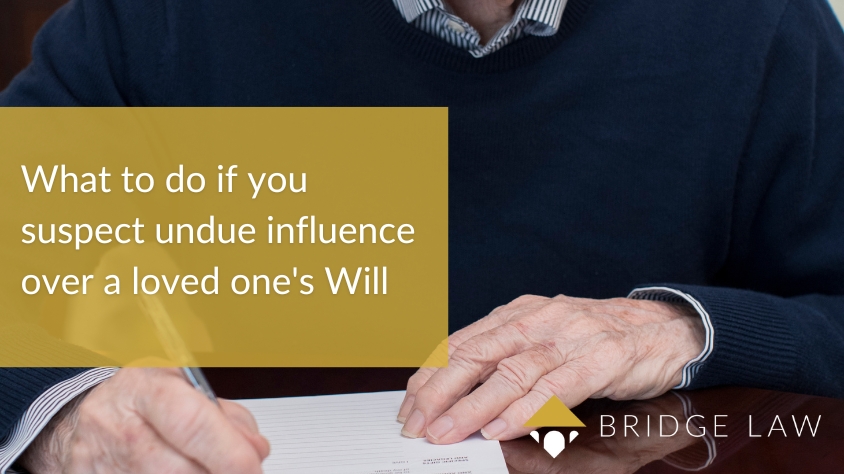What to do if you suspect undue influence over a loved one’s Will

There are various reasons why people dispute a Will. However, one of the common reasons for contesting a Will is, sadly, undue influence. In this blog, we explain more about what undue influence is and what to do if you suspect someone has been unduly influenced when making their Will.
What does undue influence mean?
The term undue influence refers to when someone has been forced or coerced into an action/decision that isn’t of their own free will – via means such as physical or emotional abuse, threats, bullying or manipulation – such as persistent nagging or cajoling someone until they comply simply so they can live a ‘quiet life’.
In the matter of Wills, a claim for undue influence is made when there is the belief that the person was pressured into writing or making changes to a Will, that they would not have done if they were not being pressured into doing so.
Successful claims for undue influence tend to be where the Testator (person who made the Will), was known to be weak and frail, in ill physical or mental health or dealing with cognitive decline and reliant on another person/people for their care.
To claim undue influence, you must be able to prove that much more than just persuasion has taken place – as the courts have long established persuasion or even influence will not establish a case for undue influence. To succeed in bringing a claim for undue influence evidence that the Testator’s own free judgment was overpowered is required.
Contesting a Will based on undue influence
Despite this being one of the most commonly quoted reasons claimants wish to contest a Will, undue influence is also one of the least likely to succeed.
The reason many claims for undue influence do not get past the starting block is due to the lack of any real, factual proof of the circumstances, which is often hard to find in such cases. Though it can be difficult to find evidence to prove someone was unduly influenced – this does not mean it is impossible.
If you think your loved one was coerced into writing a new Will or making changes to their Will, then it is important to set out the individual facts that have raised your suspicions, for example, if the Testator made a new Will which has huge differences compared to previous Wills.
It is also vital to gather as much evidence to support your claim as you can – as it is up to the person making the claim to prove their case.
Fraudulent Calumny – similar to undue influence but not the same thing
Fraudulent calumny is a rarely used remedy, but is a similar type of case to undue influence. In this situation, a claim can be brought to set aside an entire Will, or part of it – if you can provide proof that someone made false comments about an individual, which led to the Testator excluding that person from their Will.
Seek specialist advice to assess your case
Proving undue influence occurred can be difficult and making or defending these types of claims requires carefully examining the circumstances and detailed facts involved.
If there are suspicious circumstances surrounding the making of a Will, but you do not have strong evidence of undue influence, it might still be possible to challenge the Will based on other grounds. For example, claims for undue influence often run alongside the knowledge that the Will is invalid due to the Testator lacking capacity and/or not having knowledge of or fully approving the contents of the Will.
These cases are complex and take time to investigate. It is also important to act quickly and seek early specialist legal advice and assistance – to put the executors on notice of the claim, to stop them from distributing the estate before the claim has been dealt with.
If you suspect someone was unduly influenced to make a new Will or change their existing Will – speak to our specialist contentious trust and probate team today on 0161 427 0084 or email info@bridgelawsolicitors.co.uk.
Written by our specialist contentious trust and probate team
contentious probate, Contentious trust and probate, Contentious Wills, Probate dispute, Undue Influence, Will dispute
